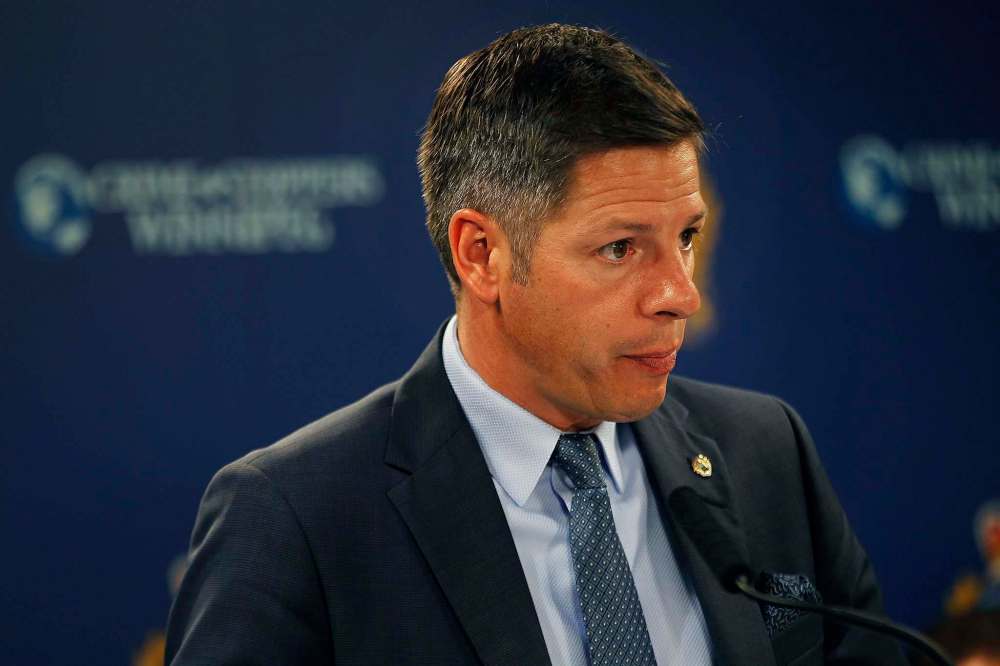Crime stats prompt politics as usual
Read this article for free:
or
Already have an account? Log in here »
To continue reading, please subscribe:
Monthly Digital Subscription
$0 for the first 4 weeks*
- Enjoy unlimited reading on winnipegfreepress.com
- Read the E-Edition, our digital replica newspaper
- Access News Break, our award-winning app
- Play interactive puzzles
*No charge for 4 weeks then price increases to the regular rate of $19.00 plus GST every four weeks. Offer available to new and qualified returning subscribers only. Cancel any time.
Monthly Digital Subscription
$4.75/week*
- Enjoy unlimited reading on winnipegfreepress.com
- Read the E-Edition, our digital replica newspaper
- Access News Break, our award-winning app
- Play interactive puzzles
*Billed as $19 plus GST every four weeks. Cancel any time.
To continue reading, please subscribe:
Add Free Press access to your Brandon Sun subscription for only an additional
$1 for the first 4 weeks*
*Your next subscription payment will increase by $1.00 and you will be charged $16.99 plus GST for four weeks. After four weeks, your payment will increase to $23.99 plus GST every four weeks.
Read unlimited articles for free today:
or
Already have an account? Log in here »
Hey there, time traveller!
This article was published 27/07/2018 (2694 days ago), so information in it may no longer be current.
There is, it seems, more than one way to politicize a crisis.
Take, for example, last week’s release of the City of Winnipeg’s 2017 crime stats report, which revealed that the number of violent, property and drug crimes has risen sharply, and that the increase is unquestionably linked to the crystal-meth epidemic that has gripped the city and province in recent years.
In 2017, violent crime in Winnipeg increased by seven per cent over the previous year. The city’s crime-severity index is at its highest level since 2012, and exceeds that of all other Canadian cities.
The numbers beyond city limits are even more startling: according to Statistics Canada data, Manitoba’s per capita homicide rate (3.51 per 100,000 residents) is highest in the country.
The province’s rural crime rate is 42 per cent higher than the urban rate, and despite Manitoba accounting for just seven per cent of Canada’s rural population, it accounts for 12 per cent of rural crime nationally.
Winnipeg Police Service Chief Danny Smyth attributed the appalling crime-stat increases directly to meth, specifically to addicts robbing, stealing and assaulting in their desperate effort to feed their drug dependency. And he added that more police intervention is not necessarily the answer the city and province need.
“One-half to two-thirds of all calls for police are to deal with families in crisis and individuals struggling with the challenges of mental health, medical and substance abuse,” he said.
One might be inclined to interpret the chief’s remarks as a call to action; Mayor Brian Bowman certainly did, calling on the province to do more to address meth’s destructive effects. The rapidly dispatched response: don’t politicize the crisis.
A warning shot across the mayor’s bow followed by a recitation of provincial government initiatives might fairly be interpreted as just a slightly different approach to politicizing a crisis.
Justice Minister Heather Stefanson and Health Minister Kelvin Goertzen issued a joint statement that the province “is not interested in playing politics with public safety.”
The statement went on to defend the efforts of Brian Pallister’s government to make communities safer, including the establishment of five Rapid Access to Addictions Medicine clinics and an investment in Manitoba’s criminal-property forfeiture fund, which will be targeted at addressing such issues as mental health, drug addiction and gang involvement.

Of course, a warning shot across the mayor’s bow followed by a recitation of provincial government initiatives might fairly be interpreted as just a slightly different approach to politicizing a crisis.
Mr. Bowman, when asked whether the downward-spiralling meth crisis could affect his bid for re-election this fall, opted for something resembling the high road, explaining that he wasn’t interested in politicizing the situation. “These (trends) are far more important than a single election,” he said.
Well-chosen words, to be sure. But one is left wondering why the current mayor was at the police-briefing podium in the first place — delivering the crime-stats numbers, disturbing as they may be, is typically the purview of the police chief and, perhaps, the chair of the police board.
The mayor’s concern for an increasingly critical civic circumstance is understandable and perhaps even laudable, but his front-and-centre presence at the announcement — and really, he seems to be front and centre at everything these days as this fall’s civic vote draws nearer — suggests a secondary imperative might also have been in play.
When in politics, politicize.












